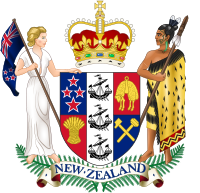Court of Appeal of New Zealand
| Court of Appeal of New Zealand | |
|---|---|
| Te Kōti Pīra o Aotearoa (Māori) | |
 |
|
| Established | 1862 |
| Location | Cnr Molesworth & Aitken Streets, Wellington |
| Composition method | Appointed by the Governor-General on the advice of the Attorney-General |
| Authorized by | Judicature Act 1908 (NZ) |
| Decisions are appealed to | Supreme Court of New Zealand |
| Decisions are heard for appeals from | |
| Number of positions | 10 |
| Website | courtsofnz.govt.nz |
| President of the Court of Appeal of New Zealand | |
| Currently | The Hon. Justice Stephen Kós, QC |
| Since | 22 July 2016 |
The Court of Appeal of New Zealand, located in Wellington, is New Zealand’s principal intermediate appellate court. It is also the final appellate court for a number of matters. In practice, most appeals are resolved at this intermediate appellate level, rather than in the Supreme Court. The Court of Appeal has existed as a separate court since 1862 but, until 1957, it was composed of Judges of the High Court sitting periodically in panels. In 1957 the Court of Appeal was reconstituted as a permanent court separate from the High Court.
The President and nine other permanent appellate Judges constitute the full-time working membership of the Court.
The Court sits in panels of five Judges and three Judges depending on the nature and wider significance of the particular case. A considerable number of three-Judge cases are heard by Divisional Courts consisting of one permanent Court of Appeal Judge and two High Court Judges seconded for that purpose.
In the main, criminal appeals will be allocated to a Divisional Court unless the President otherwise directs. This recognises the insights which Judges with current trial experience bring to criminal appeals. Counsel for the appellant or respondent may request a direction that a particular appeal be instead allocated to a Permanent Court or a Full Court.
Longer civil appeals or areas that raise legal issues of public significance will usually be allocated to a Permanent Court. Appeals from decisions of Associate Judges of the High Court and shorter civil appeals that raise mainly factual issues, usually will be allocated to a Divisional Court unless the President otherwise directs. Again counsel for the appellant or respondent may request a direction that a particular appeal be allocated to a Divisional Court, a Permanent Court or a Full Court.
The President will also determine whether an appeal (criminal or civil) is of sufficient significance to warrant the consideration of a Full Court of five members. The President will, where appropriate, consult with other permanent Judges. Such a decision typically is made only once or twice a year.
How cases come to the court
The Court of Appeal deals with civil and criminal appeals from matters heard in the High Court, and serious criminal charges from the District Court. Matters appealed to the High Court from the District Court and certain tribunals can be taken to the Court of Appeal with leave, if a second appeal is warranted. The Court may also grant leave to hear appeals against pre-trial rulings in criminal cases, and appeals on questions of law from the Employment Court.
...
Wikipedia
